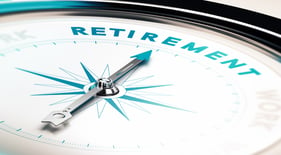
You've been dedicated to your career - loved your job - but recently you're not so sure the hours or stress are worth it.
You're at a crossroads that many people come to at some point in their working years. There are many reasons why you come to this point - job stress, management/policy changes in your company, maybe even a change in your personal life. Regardless of how you got here, the big question to ask is - "Is early retirement the right move?" Here are a few issues for you to consider as you decide if it's time to jump out of full-time work and into retirement.
- Do I have enough money to retire?
Leaving the workforce can be a difficult transition in many ways, but answering this question can certainly help you navigate this life change. Moving from income generation to drawing out savings to fund expenses can be a little scary if you don't know your numbers!
👉For more on this check out our recent episode of 5 Minute Finances on the "4% Safe" Rule!Be aware that if you're under age 59½ you may be penalized for taking funds from your retirement accounts (And this is on top of the taxes!)
Even if you feel that you have enough cash on hand to avoid drawing on your investments, you should still consider possible adjustments to your investment mix. As you exit the workforce, protecting your assets becomes more important. Being prepared to ride out any possible downturns is key when your investment accounts are the cornerstone of your retirement lifestyle.
- Will I be able to maintain my current lifestyle?
Developing a good understanding of your household expenses now will help you avoid future headaches! One of the trade-offs of choosing retirement could be a reduction to your income. Making adjustments to your expenses before retirement will give you a better chance of transitioning smoothly into early retirement.
Be sure that you also consider one-time expenses such as a dream vacation or home renovation. Additionally be aware of unexpected issues such as caring for aging parents, grown children returning to the nest, and inflation.
👉 Read "Will Your Money Last as Long as You Do?"
- How will I handle health care when my employer no longer covers me?
When your health insurance coverage through your employer runs out, you may be eligible to get coverage through state exchanges or COBRA. You may find that these plans cost more that you are currently paying with employer sponsored plans. Health care and related expenses could wreck your retirement finances if you have not made careful plans.
You are generally not eligible for Medicare until age 65, and even then you may have the additional cost of supplemental insurance. It's critical to maintain health insurance coverage, because health status can make it very difficult to get on a new plan.
We advise you to consult a health insurance professional to help you navigate your options and make the best possible choice for your health care needs.
In our years of experience with clients navigating pre-retirement we have found that there are "non-financial" questions to consider at well.
-
-
What do you plan to do with your time now that you're not working?
-
How will your spouse and family react to you no longer working?
-
What are the trade-offs that you will be making by ending your career early?
-
Retiring early can offer many opportunities for you - volunteering, travel, caring for family, hobbies. Taking the time now to answer these critical questions can help you avoid pitfalls as you transition smoothly into the next season of life.
Do you have other questions about early retirement?
Text our team for answers at 309-925-2043!

